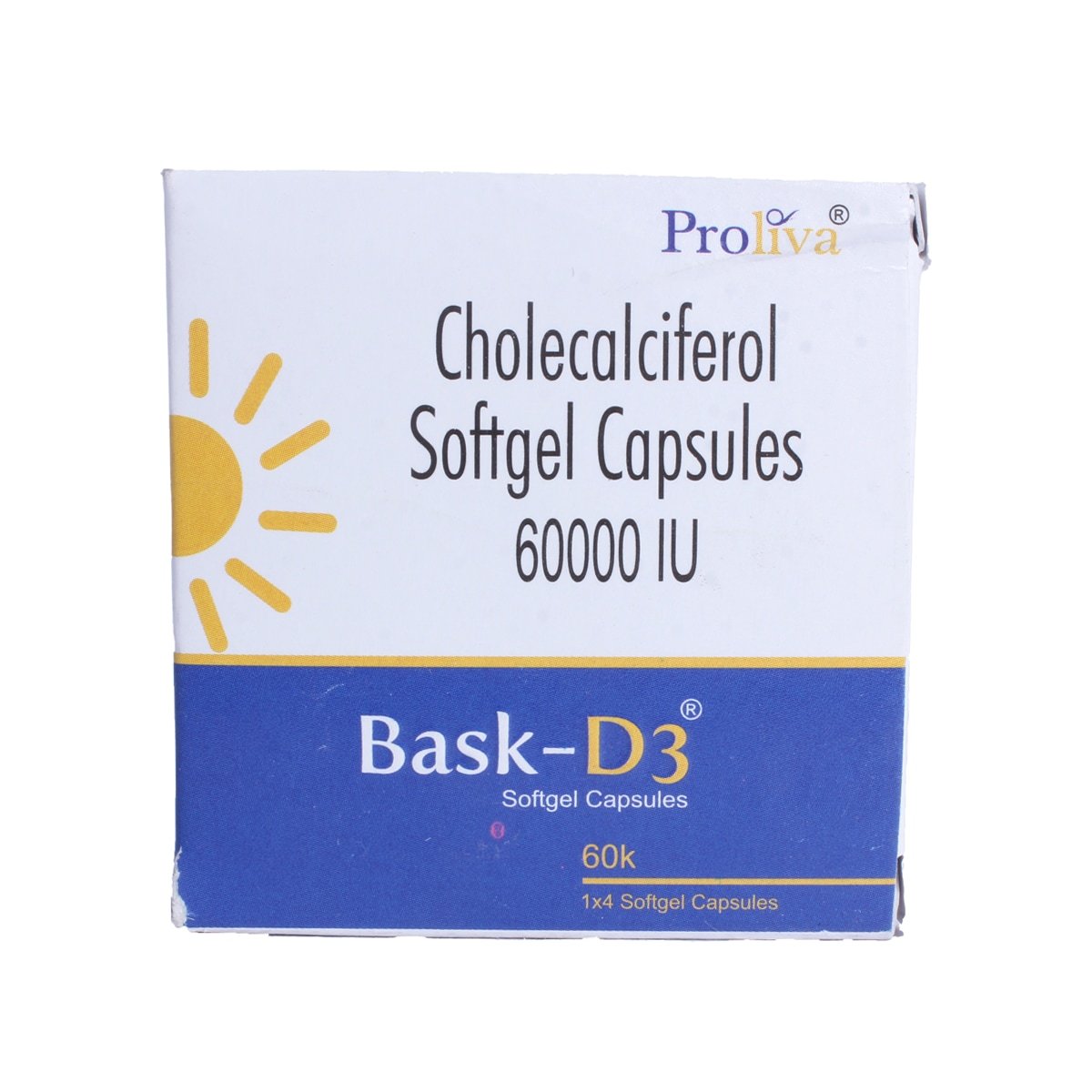Cholecalciferol
About Cholecalciferol
Cholecalciferol belongs to the class of 'Vitamins', primarily used to treat low blood calcium levels. Cholecalciferol effectively treats various conditions in the body like Vitamin D deficiency, osteoporosis (weak and brittle bones), hypoparathyroidism (parathyroid glands make low levels of calcium in the body), latent tetany (a muscle disease with low blood calcium levels) and rickets or osteomalacia (softening or deforming of bones due to lack of calcium). Vitamin D deficiency occurs when your body has low Vitamin D levels and is caused due to inadequate nutrition, intestinal malabsorption or lack of sunlight exposure.
Cholecalciferol contains 'Cholecalciferol' a form of vitamin-D. It acts by promoting the absorption of calcium, phosphates and Vitamin A from different organs and helps in maintaining overall health.
Take Cholecalciferol as advised. Your physician will decide the dosage based on your medical condition. Cholecalciferol is likely safe to consume. In some cases, it may cause side effects like constipation, increased blood calcium levels, increased calcium levels in urine, vomiting, nausea. These side effects do not require medical attention and gradually resolve over time. If these side effects persist, please consult your physician immediately.
Tell your physician if you are allergic to Cholecalciferol. Chewable or dissolving tablets may contain sugar or aspartame, hence caution should be taken in diabetes and phenylketonuria (increased levels of an amino acid called phenylalanine). Pregnant or breastfeeding women should consult their physician before taking Cholecalciferol. Higher doses of Vitamin D than the recommended daily dose should be used in pregnant women only when advised by the doctor. Cholecalciferol passes into the breast milk, hence breastfeeding mothers need to seek medical advice before starting Cholecalciferol. Cholecalciferol is safe to use in children when recommended by the pediatrician. Cholecalciferol should be used with caution in hypercalcemia, renal impairment, heart diseases, kidney stones and hypervitaminosis D (having too much vitamin D).
Uses of Cholecalciferol
Medicinal Benefits
Cholecalciferol is used to treat low blood calcium levels. It effectively treats various conditions in the body like Vitamin D deficiency, osteoporosis, hypoparathyroidism, latent tetany and rickets or osteomalacia. Cholecalciferol contains Cholecalciferol (Vitamin D3). Cholecalciferol is a steroid hormone produced in the skin when exposed to ultraviolet light or obtained from food sources. It is a provitamin that is converted into vitamin after intake. It helps maintain blood calcium and phosphorus levels and mineralization of bone. Cholecalciferol is also used in the treatment of familial hypophosphatemia (a group of rare inherited disorders characterized by impaired kidney conservation of phosphate and in some cases, altered vitamin D metabolism).
Directions for Use
Storage
Side Effects of Cholecalciferol
- Constipation
- Increased blood calcium levels
- Increased calcium levels in urine
- Vomiting
- Nausea
- Chest pain, feeling short of breath
Drug Warnings
Tell your physician if you are allergic to Cholecalciferol. Chewable or dissolving tablets may contain sugar or aspartame, hence caution should be taken in diabetes and phenylketonuria (increased levels of an amino acid called phenylalanine). Pregnant or breastfeeding women should consult their physician before taking Cholecalciferol. Higher doses of Vitamin D than the recommended daily dose should be used in pregnant women only when advised by the doctor. Cholecalciferol passes into the breast milk, hence breastfeeding mothers need to seek medical advice before starting Cholecalciferol. Cholecalciferol is safe to use in children when advised by the doctor. Cholecalciferol should be used with caution in hypercalcemia, hyperparathyroidism, renal impairment, electrolyte imbalance, heart diseases, kidney stones and hypervitaminosis D (having too much vitamin D).
Drug Interactions
Drug-Drug Interactions: Cholecalciferol may interact with drugs treating high cholesterol levels (cholestyramine), anti-epileptic (carbamazepine, phenobarbital), antibiotics (doxycycline, neomycin, and chloramphenicol), drugs treating bone loss (alendronate), thyroid hormone (levothyroxine), diuretics (hydrochlorothiazide) and heart-related medicines (digoxin).
Drug-Food Interactions: Avoid or reduce the intake of caffeine, soft drinks and alcohol that inhibit calcium absorption.
Drug-Disease Interactions: Cholecalciferol is contraindicated in hypercalcemia, hyperparathyroidism, hypervitaminosis D, malabsorption syndrome, Vitamin D toxicity, heart/kidney/liver/blood vessel diseases, kidney stones, diabetes and phenylketonuria.
Drug-Drug Interactions Checker List:
Safety Advice

Alcohol
cautionDrinking alcohol can affect calcium absorption, hence it is advised to limit the alcohol intake while using Cholecalciferol.

Pregnancy
cautionDuring pregnancy, use higher doses of Cholecalciferol than the daily dietary allowance only when advised by the doctor. Your physician will weigh the potential risks and benefits before recommending Cholecalciferol.

Breast Feeding
cautionConsult your physician before taking Cholecalciferol if you are breastfeeding. Cholecalciferol can pass into the breast milk. If Cholecalciferol is used during breastfeeding, please monitor the mother and the infant's serum calcium levels.

Driving
cautionIf you experience any dizziness while using Cholecalciferol, do not drive or operate machinery. Please consult your doctor if you experience any dizziness.

Liver
cautionLet your physician know if you have any history of liver diseases before taking Cholecalciferol. Hepatic impairment/liver disease can alter the metabolic and therapeutic activity of certain Vitamin D forms.

Kidney
cautionIt is advised to seek physician advice before starting Cholecalciferol if you have kidney diseases like kidney stones or undergoing dialysis. Caution should be taken in patients undergoing dialysis to maintain adequate phosphorus levels and avoid ectopic calcification (calcium deposition).

Children
cautionThe physician will suggest the dosage of Cholecalciferol based on the child's age and weight.
Habit Forming
Diet & Lifestyle Advise
- Include dairy products like milk, yogurt, cheese or milk-based custard in your diet.
- Eat daily a serving of broccoli, cabbage, spinach and other green leafy vegetables.
- Include the best dietary sources of vitamin D, such as fish liver oils and vitamin D–fortified milk.
- Snack on calcium-rich nuts like Brazil nuts or almonds.
- Sprinkle sesame seeds over your food, vegetables and salads. Sesame seeds are high in calcium.
- Avoid or reduce the intake of caffeine, soft drinks and alcohol that inhibit calcium absorption.
- Replace the meat with tofu or tempeh for extra calcium in your food.
Special Advise
- Cholecalciferol may interfere with cholesterol tests, hence please inform your physician and laboratory staff that you are taking Cholecalciferol before undergoing blood tests.
- Clinical monitoring of serum electrolyte concentrations and cardiac function is recommended.
Patients Concern
Disease/Condition Glossary
Vitamin D deficiency: When a person cannot get enough Vitamin D through food and exposure to sunlight, it leads to vitamin D deficiency. It often leads to thin, brittle, or misshapen bones.
Osteoporosis: It is a bone disease that weakens and brittle bones by decreasing bone density.
Tetany: A disease condition due to low levels of calcium (hypocalcemia) in the body that causes cramps and spasms in the hands, feet, and larynx (voice box).
Osteomalacia/Rickets: A disease caused by softening and weakening bones in children due to inadequate vitamin D.
Hypoparathyroidism: It is a disease characterized by low parathyroid hormone levels. This can cause low calcium levels and trigger tetany (muscle cramps, spasms, or tremors).
FAQs
Cholecalciferol contains 'Cholecalciferol' is a form of vitamin-D. Cholecalciferol (vitamin D3) supplement acts by promoting the absorption of calcium, phosphates and Vitamin A from different organs and helps in maintaining overall health.
Cholecalciferol may cause common side effects like constipation, increased blood calcium levels, increased calcium levels in urine, vomiting, nausea. These side effects do not require medical attention and gradually resolve over time. If these side effects persist, please consult your doctor immediately.
Cholecalciferol should be used with caution in conditions like hypercalcemia, liver problems, kidney problems, heart problems, hypervitaminosis, kidney stones, phenylketonuria and diabetes.
Cholecalciferol is used to increase low levels of calcium in the body. Hence it is not advised to use Cholecalciferol during hypercalcemia, since it causes the overdose of calcium leading to kidney stones and other effects.
If you miss a dose, take it as soon as you remember. However, if it is time for the next scheduled dose, skip the missed dose and follow your usual dosage.
Available Medicines for
Cholecalciferol

Marshel D3 60K Sugar Free Coffee Flavour Chewable Tablet 4's
1 Strip
₹99 (MRP 110)10%Off
cashback: 0

Bestovit-D3 Nano Shot 60K Sugar Free Butterscotch Solution 5 ml
1 Bottle
₹234 (MRP 260)10%Off
cashback: 0

Bontas-Nano Shot Sugar Free Delicious Flavour Oral Solution 5 ml 4's
1 Bottle
₹55.4 (MRP 61.5)10%Off
cashback: 0



